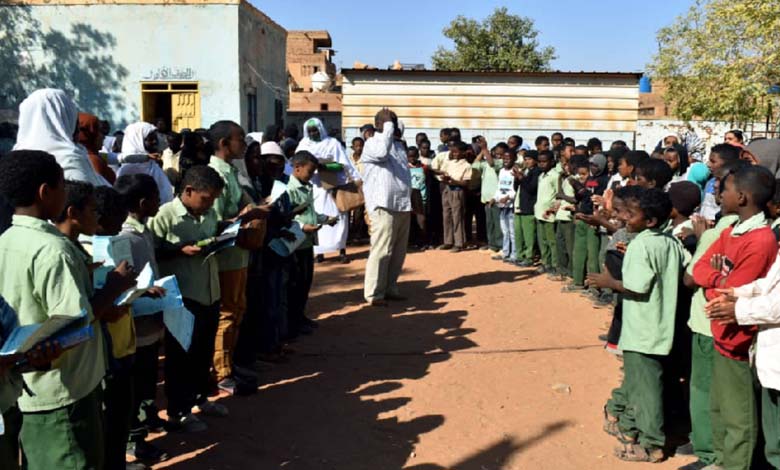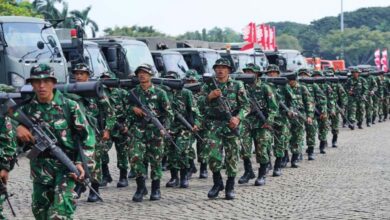Sudan: Warning of a Devastating “Educational Gap” Threatening the Future of Millions

Concerns are growing in Sudan about the worsening of the severe “educational gap” affecting millions of primary and higher education students, following the loss of two entire academic years due to the ongoing war in the country for about 16 months. This situation is further compounded by warnings about the catastrophic consequences that could arise from the partial reopening of schools in some relatively safe areas.
Since the outbreak of war in mid-April 2023, around 19 million students have lost access to schools and universities. While education has gradually resumed in some areas, it remains suspended in the most densely populated regions, such as Khartoum, Darfur, and the Blue Nile, which house more than 75% of the schools and universities.
More than half of the schools, universities, institutes, and higher education colleges, both public and private, in Khartoum and other cities have suffered total or partial destruction due to intense aerial and artillery bombardments.
Sami al-Baqir, spokesperson for the Sudanese Teachers Committee, described the educational situation as “tragic,” emphasizing that the solution lies in an international mechanism that compels the warring parties to protect civilians and avoid schools and educational institutions.
Al-Baqir told Sky News Arabia: “Education in emergencies and wars is part of the programs endorsed by the United Nations and other international organizations, by requiring the warring parties to protect civilians, including school students. However, this option requires the presence of a third party to ensure that both sides of the conflict adhere to international law principles, particularly staying away from civilian areas and schools.”
He added that resuming education in some states was a “violation of the principles of justice and inclusivity in the educational process, leading to catastrophic consequences.” He explained: “While we fully acknowledge the need for education to continue, the policy of fragmenting the educational process and restricting it to specific areas could be a precursor to the division of Sudan.”
Education or Security?
The decisions to open schools in some areas but not others come amidst complex security conditions and the dispersion of millions of students in displacement and refugee camps both inside and outside the country. However, the Teachers Committee stated that the decisions to resume classes under current conditions “lack prioritization, placing education ahead of the safety and well-being of students.”
The committee noted that decisions to resume classes in some regions, such as Omdurman, one of the three cities in the capital, coincided with a significant increase in the number of casualties from random shelling.
It also highlighted that the “partial resumption ignores the rights of teachers and educational staff, estimated at around 350,000 people,” with only a few receiving their salaries since the war began. Additionally, it pointed out the neglect of the plight of students scattered in refugee camps, due to ongoing internet and communication outages, and significant security challenges.
On the other hand, the prolonged war and halt in education in many parts of the country raise major concerns about students’ futures and their psychological well-being, where hope fades and frustration increases.
In this context, Ahmed Al-Abuabi, a consultant psychiatrist and associate professor at Baha University in Saudi Arabia, warns of the serious psychological and social effects resulting from the disruption of students’ education.
No Hope
Al-Abuabi told Sky News Arabia: “Students are experiencing anxiety and depression due to the circumstances threatening their future and academic and professional development opportunities.”
He explained: “The feeling of losing the future and the lack of hope for returning to school exacerbates the psychological challenges for students, especially those from families struggling with financial hardship and limited options to continue their education.”
Although a few families have succeeded in enrolling their children in schools or universities in neighboring countries, they faced significant difficulties in terms of costs and adapting to the educational systems of those countries. Some have had to sacrifice two or more academic years and start from lower levels than those they had reached before the war in their original universities or schools in Sudan.
In recent months, some educational institutions have attempted to open facilities in safe areas, but most of these attempts have failed due to the expansion of fighting to cover about 70% of the country’s regions and the lack of an adequate educational environment in the few remaining safe areas.
Some of these institutions have also faced severe criticism for imposing additional exorbitant fees, beyond the financial capabilities of students and their families, in a context of major economic collapse in Sudan, with more than 60% of the population losing their sources of income.












